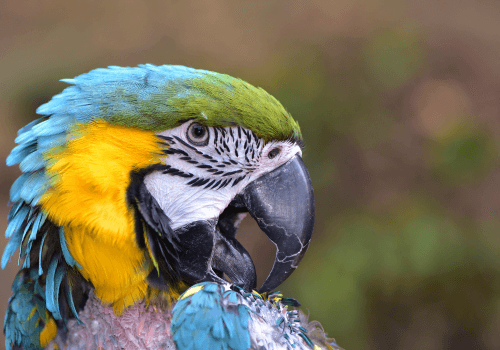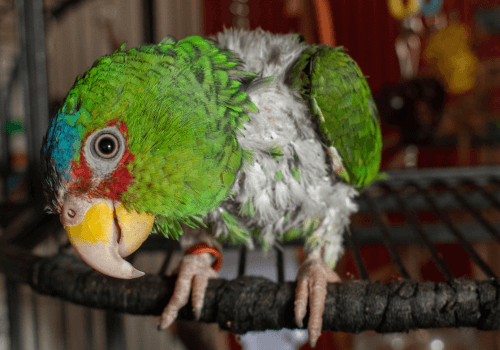Feather plucking, also known as feather picking, can feel like a never-ending battle for bird owners. Watching your beautiful bird tear out its own feathers is heart-wrenching and frustrating! This puzzling behavior isn’t limited to one species. It’s a common issue in feathered friends like African greys, cockatoos, and macaws, leaving pet parents wondering, “Why is my bird doing this?”
Beyond just the physical impact, feather plucking can take a toll on both your bird’s health and your peace of mind. But don’t worry—we’re here to help! In this blog, we’ll break down everything you need to know about feather plucking. Let’s take some time to uncover causes and, most importantly, effective solutions to help your bird feel happy and healthy again!
What Is Feather Plucking?
Feather plucking is more than just a frustrating habit—it’s a serious and self-destructive behavior where birds excessively chew or pull out their own feathers. This can range from mild feather damage to large patches of baldness, and in severe cases, it may even escalate to painful self-mutilation of the skin. While occasional preening is perfectly normal, compulsive plucking is a clear sign of an underlying issue that needs prompt attention.

Unfortunately, feather plucking is not uncommon in captive birds. According to a study by the University of California, Davis, approximately 10-15% of pet birds are affected by this behavior. It can impact both male and female birds, but certain species—such as African grey parrots and cockatoos—are especially prone to it. Understanding the prevalence and severity of feather plucking is important for bird owners to recognize its seriousness and take timely steps to address the root causes.
Common Causes Of Feather Plucking In Birds
Feather plucking is a complex behavior that can stem from various factors. These causes can be categorized into medical, environmental, and psychological triggers:
1. Medical Causes
Feather plucking may be the result of an underlying medical condition. Common medical causes include:
- Allergies: Birds can develop allergic reactions to environmental factors, such as dust or mites, leading to itching and irritation.
- Skin infections: Bacterial, fungal, or parasitic infections can cause skin discomfort, prompting birds to pluck their feathers.
- Hormonal imbalances: Hormonal fluctuations, particularly during breeding season, can increase a bird’s stress levels and trigger feather plucking.
- Nutritional deficiencies: Poor diet lacking essential vitamins, especially Vitamin A, can contribute to skin and feather health issues, leading to feather plucking. Nutritional imbalances, such as a lack of fatty acids or calcium, can also affect the bird’s feather quality and health.
2. Environmental Causes
Environmental factors play a crucial role in a bird’s behavior and well-being. Stressful environments often trigger feather plucking. Some common environmental causes include:
- Boredom and lack of stimulation: Birds are intelligent creatures that need mental and physical enrichment. Without proper toys, social interaction, and challenges, birds may become bored and resort to feather plucking to cope.
- Improper lighting: Birds need exposure to natural sunlight or full-spectrum lighting to maintain their circadian rhythms. Inadequate lighting can lead to hormonal imbalances and stress.
- Humidity and temperature: Birds thrive in specific environmental conditions. Low humidity levels can cause dry skin, which may lead to feather plucking as the bird attempts to alleviate the discomfort.
- Noise and stress: A chaotic or noisy environment can create anxiety in birds, leading to behaviors like feather plucking as a response to stress.
3. Psychological Causes
Feather plucking is often compared to obsessive-compulsive disorders in humans. Birds are highly social animals, and the absence of social interaction can lead to psychological distress. Some common psychological triggers include:
- Separation anxiety: Birds form strong bonds with their owners or other birds. When left alone for long periods, they may develop anxiety, leading to feather plucking as a coping mechanism.
- Lack of companionship: Birds that lack social interaction, either from humans or other birds, may pluck their feathers out of loneliness or depression.
- Trauma or past experiences: Birds that have been rehomed, neglected, or subjected to trauma may develop psychological issues, including feather plucking.
How To Prevent And Cure Feather Plucking In Birds

Addressing feather plucking involves identifying the root cause and implementing a multifaceted approach. Since it’s often a result of combined factors, solutions may vary depending on the bird’s specific condition. Here are some strategies:
1. Veterinary Care And Medical Treatment
- The first step in addressing feather plucking is to rule out any underlying medical conditions. A comprehensive exam by an avian veterinarian, including blood tests, skin scrapings, and cultures, can help diagnose infections, allergies, or nutritional deficiencies.
- Treating infections or allergies with the appropriate medications (such as antibiotics or antifungal treatments) can relieve the bird’s discomfort.
- If a nutritional deficiency is diagnosed, your vet may recommend a dietary plan rich in essential vitamins, particularly Vitamin A, and minerals to improve skin and feather health.
2. Behavioral And Environmental Adjustments
- Enrichment: Providing your bird with plenty of mental and physical stimulation is crucial. Introduce new toys, foraging opportunities, and puzzles to keep your bird engaged. Rotate toys frequently to maintain your bird’s interest.
- Diet: A balanced diet is essential for preventing feather plucking. Consult your vet to ensure your bird is receiving a diet appropriate for its species, including a mix of pellets, fresh fruits, vegetables, and seeds. Avoid excessive fatty or sugary treats.
- Lighting: Ensure your bird receives adequate exposure to natural sunlight or full-spectrum lighting for at least 10-12 hours a day. This helps regulate their hormonal balance and overall well-being.
- Humidity and temperature: Maintain the right humidity levels (typically between 40-60%) to prevent dry skin. Use a humidifier if needed, and keep your bird’s living environment at a comfortable temperature.
- Social interaction: Birds need social interaction to thrive. Spend quality time with your bird, provide it with companionship, and avoid leaving it alone for long periods.
3. Psychological Support And Behavioral Therapy
- If feather plucking is due to psychological issues, behavioral therapy may be necessary. Working with an avian behaviorist can help address underlying anxiety, depression, or trauma.
- Positive reinforcement: Encourage good behavior by rewarding your bird with treats or praise when it refrains from plucking.
- Reducing anxiety: If separation anxiety is a trigger, try to gradually increase the amount of time your bird spends alone while providing enrichment activities to reduce stress.
Conclusion
Feather plucking is a multifaceted issue that requires a comprehensive approach to diagnose and treat. By addressing medical, environmental, and psychological factors, pet owners can help their birds overcome this destructive behavior. Regular veterinary care, a stimulating environment, and proper nutrition play pivotal roles in maintaining your bird’s health and well-being.
If you suspect your bird is feather plucking, consult with an avian veterinarian to develop a tailored treatment plan that addresses the root cause of the issue. Remember, early intervention is key to preventing the behavior from becoming a chronic and more difficult problem to manage.
If you have questions and you’d like to reach out to us, you can call us directly at (201) 350-1802, or you can email us at info@oradell.com. Don’t forget to follow us on social media Facebook, Instagram.
